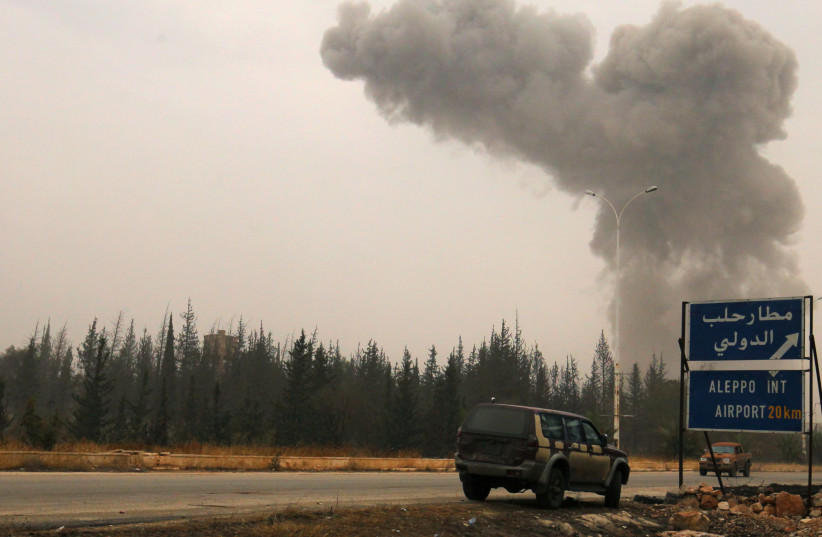Airstrikes near Aleppo overnight on Monday were widely covered in regional media and also in Russia, illustrating how Turkey, Russia, Iran and other countries in the Gulf are all increasingly focused on what is happening in northern Syria. This is important because the Syrian regime has accused Israel of the airstrikes, claiming Syrian air defenses responded to an "Israeli aggression.” The Syrian regime had just participated in high level meetings in Jordan with several important Arab states, and Syria is hosting Iran’s president this week and recently sent a delegation to Moscow.
The airstrikes in Aleppo are not the first of their kind. There have been numerous incidents at Aleppo airport and also neighboring areas. This is in part because Iran has increased weapons trafficking using Aleppo’s airport to move munitions and weapons to Hezbollah. Aleppo provides an easy conduit to Lebanon because trucks can pass through Homs and Qusayr, where Hezbollah has a presence. Previously Iran would use Damascus or T-4 airbase. Iran has been entrenching in Syria for years. Israel has waged a Campaign Between the Wars to reduce that entrenchment. Iran now prefers Aleppo because it thinks it is further away from Israel and it can use the area as cover. It has claimed to be helping with earthquake aid, but reports say it uses the cover of aid to move munitions.
Strikes see extensive coverage by regional media
Al-Ain media in the Gulf focused on the airstrikes in an article this morning. It reports on the Campaign Between the Wars and also on the current tensions in the region. Russia’s state media TASS also reported on the strikes. This shows Russia is openly accusing Israel and highlighting the incident. “Israeli Air Force planes on Tuesday launched missile strikes on Syrian army positions on the outskirts of the city of Aleppo (360 km from Damascus). According to the Syria TV channel, the Israeli attack damaged the runway of Aleppo International Airport,” TASS said.
TASS says Syrian media “also quoted a source in the armed forces’ command as saying that one Syrian serviceman was killed and seven others were wounded when repulsing the attack. ‘our anti-aircraft gunners managed to hit several air targets,’ he specified, ‘One Syrian serviceman was killed and seven others, including two civilians, were wounded in repulsing the attack.’” Syria uses Russian-made air defense systems. The article points out that “on March 7, Aleppo International Airport remained shut down for more than two weeks after the Israeli attack.”

Turkish media also covered the attack. State media TRT noted that “Israel carried out the missile attack in the southeast of Aleppo, targeting the airport and some sites in the vicinity of the Syrian city and causing some material damage, the source was quoted as saying. Israel has for years been carrying out attacks against what it has described as Iran-linked targets in Syria, where Tehran's influence has grown since it began supporting President Bashar al Assad in the civil war that started in 2011.” Turkey’s coverage also shows that Ankara is interested in what is happening in Aleppo, which is very close to Turkey’s border.
Pro-Iranian media also mentioned the attack. Al-Mayadeen highlighted the incident. The overall context is that there is increased focus on this airstrike in contrast to some of the previous ones. The regional moves in which Syria seeks to normalize ties is likely part of this context.
